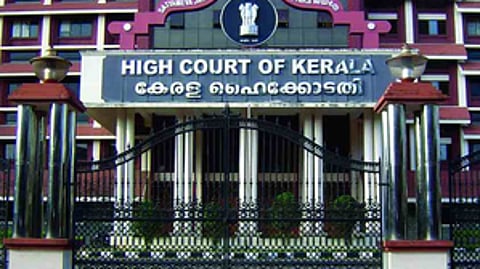

Follow TNM’s WhatsApp channel for news updates and story links.
Dismissing a writ petition, the Kerala High Court, on Wednesday, October 22, said that temple priesthood cannot be restricted to caste or lineage. A Division Bench comprising Justice Raja Vijayaraghavan V and Justice KV Jayakumar observed that a temple priest’s caste or lineage does not constitute an “essential religious practice”, as envisioned by the Constitution. The Bench added that appointments to the post of priests must be based on merit and qualification rather than heredity.
The writ petition was filed by the Akhila Kerala Thanthri Samajam (AKTS), challenging the accreditation and recognition granted to Thanthra Vidyalayas by the Travancore Devaswom Board (TDB) and the Kerala Devaswom Recruitment Board (KDRB). AKTS is a registered body of around 300 traditional Thanthri families — the chief priests and spiritual heads of Kerala temples — dedicated to preserving and promoting Thanthric temple rituals and priestly traditions.
The Court found no merit in the petitioners’ contention that the Kerala Devaswom Recruitment Board lacked the expertise to accredit Thanthra Vidyalayas or that such recognition diluted traditional practices.
“To insist that a person must belong to a particular caste or lineage to be eligible for appointment cannot, in our considered view, be construed as an insistence upon an essential religious practice, rite, or mode of worship. No factual or legal foundation has been established to justify such a claim in the present case,” the Bench said.
The petitioners, representing around 300 traditional Thanthri families, had argued that only those trained under hereditary Thanthris should be eligible for appointment as priests and that the KDRB’s recognition of Thanthra Vidyalayas violated the rights guaranteed under Articles 25 and 26 of the Constitution.
Rejecting these arguments, the Court said: “The materials placed before us reveal that the TDB and KDRB have established a rigorous institutional mechanism prior to granting accreditation. The syllabus encompasses Vedic texts, rituals, religious observances, and modes of worship imparted by qualified scholars and Thanthris.”
The Bench also noted that the KDRB’s system included both theoretical and practical training extending from one to five years, followed by initiation ceremonies before candidates could assume temple duties. Further, the final selection was based strictly on merit by a committee that included a reputed Thanthri.
The Court underscored that the Travancore Devaswom Board Officers’ and Servants’ Service Rules, 2022, were framed with the concurrence of the government and after public notification. It held that the KDRB, under Section 9(5) of the Kerala Devaswom Recruitment Board Act, 2015, was empowered to prescribe qualifications for appointments and issue directions to the Devaswom Boards.
“The Board is competent to determine the educational, technical, and other eligibility criteria for each category of post, thereby ensuring that appointments are made only from among qualified and competent candidates,” the Court said.
On the constitutional question, the Bench found no infringement of the rights under Articles 25 and 26, holding that AKTS could not claim to be a religious denomination entitled to such protection.
“No custom or usage, even if traceable to pre-constitutional times, can be recognised as a source of law if it violates human rights, dignity, or the constitutional principles of social equality,” the Court said. “Any custom or practice that is oppressive, pernicious, or contrary to public policy cannot receive protection from courts exercising constitutional jurisdiction,” the Court added.
The Court concluded that the petition lacked merit, upholding the validity of the Travancore Devaswom Board Officers’ and Servants’ Service Rules, 2022 and dismissing the plea.